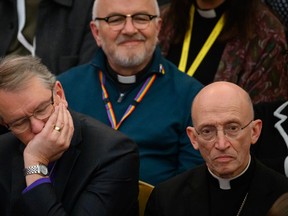
The Church of England is considering dropping male pronouns during service when referring to God.
The church’s bishops announced they are launching a major “project on gendered language” in the coming months, according to the Daily Mail.
From our newsroom to your inbox at noon, the latest headlines, stories, opinion and photos from the Toronto Sun.
Thanks for signing up!
A welcome email is on its way. If you don't see it, please check your junk folder.
The next issue of Your Midday Sun will soon be in your inbox.
Priests may one day no longer use “He” and “Him” when referring to God in some prayers, and could also drop the opening words, “Our Father,” to the Lord’s Prayer.
Rev. Joanna Stobart, a vicar in the diocese of Guildford, Surrey, asked the Liturgical Commission, the committee that develops the wording used in church services, on what steps are being taken “to develop more inclusive language in our authorized liturgy” and “speak of God in a non-gendered way.”
The Rt.-Rev Michael Ipgrave replied: “We have been exploring the use of gendered language in relation to God for several years, in collaboration with the Faith and Order Commission.”
RECOMMENDED VIDEO
He revealed: “After some dialogue between the two Commissions in this area, a new joint project on gendered language will begin this spring.”
Ipgrave added, however, that a drastic reworking would have to be unanimously approved by the church’s entire governing body, the General Synod, and likely resisted by those who want to maintain the Bible’s traditional words.
The potential massive revision was welcomed by Women and the Church (WATCH), a group that campaigns for “gender justice” in the Church of England.
“We hope that a proposal will be brought to Synod soon, as we believe that a theological misreading of God as exclusively male is a driver of much continuing discrimination and sexism against women,” they said in a statement.
Synod member Rev. Ian Paul had concerns, particularly with how the rewording would change definitions.
-

Church of England apologizes for treatment of LGBTQ people
-

Church of England to consider 'human composting' and 'water cremation'
-

Church of England will no longer define 'woman'
“The fact that God is called ‘Father’ can’t be substituted by ‘Mother’ without changing meaning, nor can it be gender-neutralized to ‘Parent’ without loss of meaning,” he pointed out.
“Fathers and mothers are not interchangeable but relate to their offspring in different ways,” he added. “If the Liturgical Commission seeks to change this, then in an important way, they will be moving the doctrine of the Church away from being ‘grounded in the Scriptures.’”
Paul, however, acknowledged that while male pronouns have typically always been used when referring to God, Christians do not believe God has a specific gender.
“The Bible uses feminine imagery and metaphors of God, but primarily identifies God using masculine pronouns, names, and imagery,” he said. “Male and female imagery is not interchangeable.”


